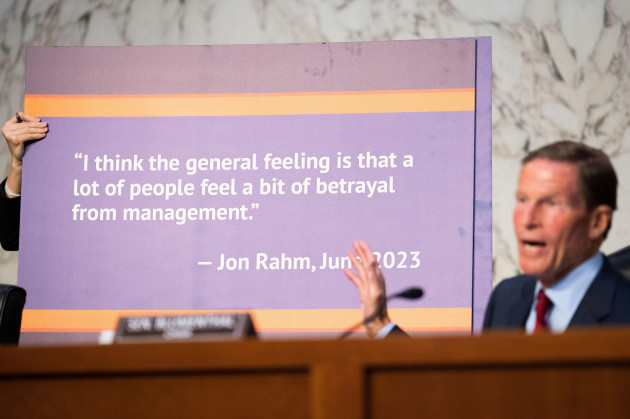HAPPY CHRISTMAS: THE war is far from over.
The schism in professional golf is yet to fuse, and if Jon Rahm ends weeks of intense rumour by making the move to LIV, then it will widen further.
The stealth of merger negotiations was what convulsed the world when it was announced earlier this year, and mantled the fact it was pretty threadbare stuff. It was merely an agreement to find an agreement by 31 December this year.
The last couple of months have been scored to ambient whispers that the deal is falling apart, and American private equity will provide more palatable bedfellows instead. Perhaps not content with battling nation states in the Premier League, Liverpool owners Fenway Sports Group have coyly said they have had “conversations” with the PGA Tour.
So if a deal is faltering, LIV’s wooing of Rahm looks either a brutal negotiating ploy to get them back on track, or else a resumption of hostilities. We might know by Friday as to which it is, when PGA Tour CEO Jay Monahan and Saudi PIF chairman Yasir Al-Rumayyan are due to meet.
Rahm’s rumoured deal is worth $300 million, perhaps enough to trigger him into reconsidering his objections to the LIV format and renounce his on-record fealty to the PGA Tour.
So you can call him a hypocrite, but the fact is the PGA Tour’s leadership decision to go into secretive discussions with the Saudis gave every one of their players cover for exactly what appears to be happening with Rahm. Monahan’s midsummer humiliation of Rory McIlroy was a lesson to every other PGA Tour golfer: play, or get played.
This maddening fiasco is not the logical outcome of professionalising sport, but it is the logical outcome of reducing sport solely to a money-making exercise. If you make your sport a money-grab, then the guys with the most money will always win.
The best players deserve to be lavishly paid, the middle class of competitors deserve enough to make a comfortable living and the executives deserve a good pay-packet too, but all of this has to be commensurate with the money pouring into their sport. Golf is obviously popular, but it’s hardly football or the NFL.
The last few years has seen golfers demand and earn sums which vastly overstates the total value of their sport: on what planet is a fifty-something Phil Mickelson worth $200 million?
The self-regard is not limited to the elite. Chris Stroud is the 634th-best golfer in the world: he has won once and made the cut at just over half of his 402 starts on the PGA Tour, and has made $13.3 million in prize money over his career. Yet he has signed up to play at the LIV qualifying event this week, complaining the Tour “doesn’t take care of you if you’re not in the top 30.”
Stroud had one top-ten and 14 missed cuts in his 22 events this year, and made $449,238 in prize money. For comparison, the 634th-ranked tennis player in the world made $31,855 this year. Stroud is a multi-millionaire piece of meat on a leaderboard, but seemingly this is not enough.
While these sums will hardly make a dent in the oil reserves of Saudi Arabia, they are bringing an unbearable weight on the PGA Tour. The Tour have ratcheted up prize money on offer to their best players in a bid to keep them from LIV’s clutches, but these are becoming unsustainably large. A report last month said event sponsors are being asked to pony up more cash, which will reportedly be furnished at the expense of their contributions to charity.
This is unsustainable, and what led the Tour to sit down secretly with the Saudis in the first place. The reality now is either the Tour either commits to the merger with the Saudi Public Investment Fund, or it will continue to be slowly bled by the kingdom’s riches.
Jordan Spieth was asked last week for the significance of Rahm’s potential significance, and replied, “It would be really not very good for us.” It is worst, of course, for the fan, in which the best-case scenario is now that their favourite sport becomes another political tool of Saudi Arabia. Otherwise it will be splintered and diminished; some of the best players will be lost on an unpopular tour playing an alien format while the rest joust on familiar fairways but in diluted fields.
This is unlikely to be limited to golf. The fury of football fans spiked the Super League, but who is to say it won’t some day return? The value of the Premier League’s TV rights deal is eye-watering but it has plateaued, while the rest of Europe is bankrupting itself trying to keep pace.
For now, the best footballers all compete on the same stage, but for how much longer will that last? Golf has shown that if a sport’s protagonists are driven primarily by money, then a fray, rupture and split is to be expected. Which in turn will force fans to pay more to watch something less.
Economic commentator Martin Wolff this year wrote about the failure of modern-day capitalism to maintain the sense of progress with which post-war generations were imbued, coining the phrase “our future is just not what it used to be.”
Elite sport is becoming a microcosm of this wider failure to deliver on the promise of progress.
Virtually everything that happens now seems to make sport worse: LIV, sportswashing, pay-per-view, bloating competitions, ticket pricing, GAAGo, VAR, the blanket defence, cross-continent World Cups, extreme financial imbalances, whatever structure the Heineken Cup has alighted on for this year.
The old Heineken Cup and the backpass rule feel like relics of hopeless 90s optimism, belonging beside the work of Francis Fukuyama.
But this is what happens when the guardians and stars of a sport embrace nothing but potential profit, and neglect to care for their sport’s history, tradition and, above all, structural and competitive integrity. Winning in sport is a zero-sum game but protecting that sport is based on collective compromise.
There is a hollow tragedy coming to define modern professional sport. It claims to celebrate courage, determination, skill and honour while selling itself off to a system that mocks them all.



